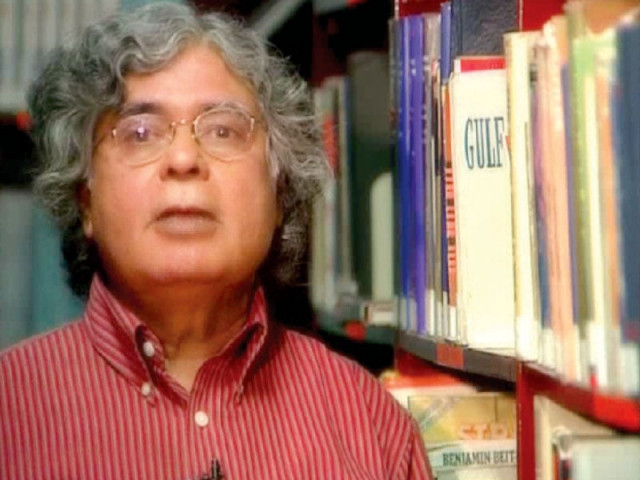United for peace: ‘Dialogue’ stirs a sense of realisation among the youth
Ghazi Salahuddin says we cannot change Karachi unless we recognise our different roles

Ghazi Salahuddin says we cannot change Karachi unless we recognise our different roles. PHOTO: FILE
He was speaking at the first session of 'Dialogue', organised by the team of 'I Am Karachi', in collaboration with the Express Media Group, at the Karachi Institute of Biotechnology and Genetic Engineering (KIBGE) on Monday. The session was moderated by Salahuddin while the panel consisted of Taimur Suri, Framji Minwalla, Salman Jawed and Sibte Sajjad.
Minwalla, a faculty member at the Institute of Business Administration, shed light on the city's demography. "In 1940, the population of Karachi was composed of 52 per cent Hindus, 30 per cent Muslims, 10 per cent Christians, five per cent Jews and three per cent Parsis," Minwalla said. "Today, approximately 95 per cent of the people are Muslims."
By comparing and contrasting the demographics, Minwalla urged the audience to identify the gap in the system. He lamented that Hindu temples and synagogues had disappeared over time. "Public spaces are gradually being encroached by the government and private institutions," said Minwalla. "The more public spaces are encroached, the less access you as a citizen, have to them."
Sajjad, a furniture designer and a teacher of interior design, added to Minwalla's point by saying that Karachi received an influx of less than 50,000 people at the time of Partition.
"It was internal migration in the 1970s that caused the vast population shift," Sajjad said. "The population shift in the 1970s has brought about radical changes to the city."
Suri, a faculty member at the Indus Valley School of Art and Architecture, said that even television and the internet are public spaces. "Everything in the city belongs to the public," Suri said. "Government and private institutions have no right to create boundaries and deprive the public of their rights."
Jawed, a teacher and architect, stressed the importance of reclaiming public spaces. He was most disturbed by the visual pollution in Karachi. "The use of unnecessary hoardings across the city has created a visual disfigurement," said Salman. "If you want to do something, you will find a way." He added that the time had come to do more and talk less.
Salahuddin explained to the audience that the diversity of Karachi had become its liability. "We, as individuals, have a responsibility towards our community and caring for the community is an integral part of successful cultures such as those in Far East Asia," he explained. "There is a general lack of civility in our society, which is a serious threat to our nation." Salahuddin said that one person's smile can stir a great amount of civility in our society. To highlight the significance of smiling, Salahuddin cited an example of Lee Kuan Yew, the first prime minister of Singapore, who made a rule for the citizens of Singapore to smile as it was also a form of charity.
The first session of 'Dialogue' was not only intense, but also thought-provoking. The students at the public administration department listened with rapt attention and even gave in their input on several occasions, making it more a dialogue than a lecture.
'Dialogue' is an attempt by the team of 'I Am Karachi' to bring together the youth of Karachi under one platform. The series hopes to stir a great deal of inspiration among youth and awaken them to make a difference in society.
'I Am Karachi' will host several more 'Dialogue' sessions in upcoming days. The second session of 'Dialogue' will take place at Kasbit today while the third will be held at the Mohammad Ali Jinnah University on April 15 (tomorrow).
Published in The Express Tribune, April 14th, 2015.



















COMMENTS
Comments are moderated and generally will be posted if they are on-topic and not abusive.
For more information, please see our Comments FAQ